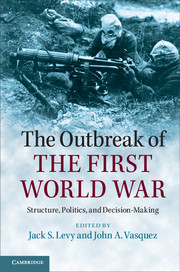Book contents
- Frontmatter
- Dedication
- Contents
- List of figures
- List of tables
- List of contributors
- Preface
- Part I Overview of debates about the causes of the First World War
- Part II Structure and agency
- 3 Strategic rivalries and complex causality in 1914
- 4 A “formidable factor in European politics”
- Part III The question of preventive war
- Part IV The role of the other powers
- References
- Index
- References
4 - A “formidable factor in European politics”
Views of Russia in 1914
Published online by Cambridge University Press: 05 July 2014
- Frontmatter
- Dedication
- Contents
- List of figures
- List of tables
- List of contributors
- Preface
- Part I Overview of debates about the causes of the First World War
- Part II Structure and agency
- 3 Strategic rivalries and complex causality in 1914
- 4 A “formidable factor in European politics”
- Part III The question of preventive war
- Part IV The role of the other powers
- References
- Index
- References
Summary
All too often accounts of pre-1914 Great Power politics still tend to view their subject through the prism of a succession of crises. These then appear as preludes to the grand finale in July 1914. In consequence, an implicit quasi-teleology, with world war as Europe’s inevitable destiny, remains endemic in much of the literature. In their efforts to discern patterns of accelerating crises historians (and political scientists in their wake) have missed other elements that were as characteristic, if not more so, of the international politics of this period. Not infrequently, these elements point in different directions to those mapped out in the extant literature. This is not to argue that generations of scholars were “wrong.” Rather, it is a plea for a more nuanced look at the events of the period before 1914, one that is aware of the openness of historical situations and the complexities of decision-making.
Two developments in the years 1911–1914 remain underdeveloped in the scholarly debate: (1) the degree to which the notion of détente had entered into the calculations of the Great Powers; and (2) the revival of Russian power. There were tensions between these two developments, tensions that cannot be resolved easily by historians, any more than they could be resolved by the decision-makers at the time. Indeed, the coexistence, in those years, of hope and pessimism, of détente and fear of war was linked together by perceptions of a revitalized Russia as the central factor in Great Power politics. As the following analysis will argue, these perceptions shaped decision-making in London, Paris, Berlin, and Vienna in July 1914.
- Type
- Chapter
- Information
- The Outbreak of the First World WarStructure, Politics, and Decision-Making, pp. 87 - 112Publisher: Cambridge University PressPrint publication year: 2014
References
- 2
- Cited by



